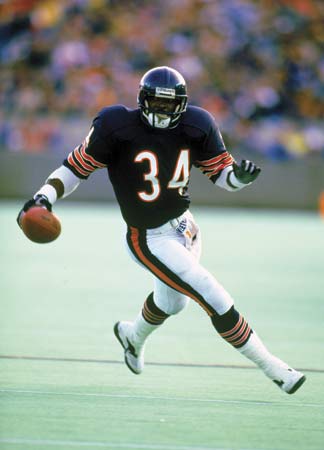Hall-of-Fame football player Walter Jerry Payton was born on July 25, 1954 in Columbia, Mississippi. He was one of three children born to Edward and Alyne Payton. Young Payton played a number of sports with his brother, Eddie. Payton attended John Jefferson High School, an all-black school for his first three years of high school, but in his senior year, he was one of the African American students who integrated formerly all-white Columbia High School. Payton played football all four years of his high school career. He then followed Eddie to play college football at Jackson State University in Jackson, Mississippi.
Payton excelled at Jackson State, rushing for more than 3,500 yards and breaking into the National College Athletic Association (NCAA) record books by scoring 65 rushing touchdowns. He graduated with a degree in communications and entered the 1975 NFL draft, where he was the fourth overall pick by the Chicago Bears. Payton’s first season with the Bears was not very impressive. He gained only 679 all-purpose yards and scored 7 touchdowns. His second season, however, was the beginning of his stardom; he rushed for more than 1,000 yards and scored 17 touchdowns.
Payton’s greatest year was in 1985, when he gained more than 1,500 rushing yards and led the Chicago Bears to a 15-1 regular season record. The Bears defeated the New England Patriots (46 to 10) to win Super Bowl XX although Payton did not score a touchdown during the game.
Payton continued having successful seasons with the Chicago Bears throughout the rest of his career. He played 13 seasons with the Chicago Bears, finishing his career with 16,726 rushing yards and scoring 110 touchdowns. Throughout his career, he amassed numerous honors including, nine Pro Bowl selections (1976-1980, 1983-1986); nine All-Pro selection (1976-1980, 1983-1986); NFL MVP (1977), two-time NFC Player of the Year (1977, 1985); Bert Bell Award (1977); Pro Bowl MVP (1978); and Super Bowl XX Champion (1985).
Walter Payton retired after the 1987 season as the NFL’s all-time leading rusher (16,726 yards), a record later broken by Emmitt Smith in the 2002 season. The Chicago Bears retired Payton’s #34 jersey in 1988, and he was inducted into the Pro Football Hall of Fame in 1993. He is widely regarded as one of the greatest running backs in NFL history.
In February 1999, Payton announced that he had a rare type of liver disease called primary sclerosing cholangitis. On November 1, 1999, Walter Payton died of the illness at the age of 45 in Chicago. More than 1,000 people gathered at Soldier Field for his funeral service.
Both the NCAA and the NFL have awards that bear Walter Payton’s name. Each season the NCAA Walter Payton Award in Division I-FCS goes to the best offensive player. In 1999, the NFL Man of the Year Award, given to a player for community service and philanthropy, was renamed the Walter Payton NFL Man of the Year Award.

